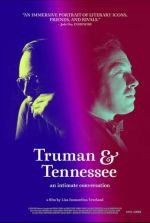Doc Corner: 'Truman & Tennessee: An Intimate Conversation'
 Thursday, July 1, 2021 at 9:00AM
Thursday, July 1, 2021 at 9:00AM By Glenn Dunks
 I think it is fair to say that Lisa Immordino Vreeland has a preoccupation with the upper class. Beginning with her feature debut in 2011—Diana Vreeland: The Eye Has to Travel about the famed French-American fashion editor (also her own grandmother-in-law)—and on through other titles about more mid-century well-to-dos, Vreeland has carved a niche out of documentary portraits that tend to coast on the infamy of the rich and famous. I have enjoyed some (2017’s Love, Cecil) more than others (2015’s Peggy Guggenheim: Art Addict).
I think it is fair to say that Lisa Immordino Vreeland has a preoccupation with the upper class. Beginning with her feature debut in 2011—Diana Vreeland: The Eye Has to Travel about the famed French-American fashion editor (also her own grandmother-in-law)—and on through other titles about more mid-century well-to-dos, Vreeland has carved a niche out of documentary portraits that tend to coast on the infamy of the rich and famous. I have enjoyed some (2017’s Love, Cecil) more than others (2015’s Peggy Guggenheim: Art Addict).
Her latest is Truman & Tennessee: An Intimate Conversation, which finds Vreeland more or less still pre-occupied with high society. A slick twist to the structural formula casts Jim Parsons and Zachary Quinto as unseen mouthpieces for the words of Truman Capote and Tennessee Williams...
This allows for some additional dramatic insight into its subjects, but it doesn't go far enough to enliven Vreeland’s film. Vreeland’s attempt at placing the lives and careers of two iconic queer wordsmiths side-by-side has its benefits. Most notably in the just the sheer honest fact that listening to their words—often poetic, sometimes bitchy, but always enthralling—is almost always going to be a hell of a lot more interesting than anybody else’s. Their wit and their literate candour is all but unparalleled and audiences could surely do far worse with their 90 minutes than marvelling at their keen observations on life.

On the other hand, the film’s observations of each, while smart, are a little uninspiring given the subjects. Nonetheless, its charting of their careers has some lovely, affectionate flourishes. Particularly so regarding their public personas as openly homosexual men and the way Hollywood had to soften their queer edges.
What the real shame of this is, is that this concept of an “intimate conversation” wasn’t pushed any further beyond actors reciting from books. Positioned as something of a cinematic duel, the pair rarely actually cross paths in the film. This isn’t, for example, a Hitchcock/Truffaut or Best of Enemies situation. Rather, Vreeland and editor Bernadine Colish choose to merely place archival footage of each side by side; their stories conveniently similar in how they rose to feted prominence and their eventual cultural downfall. Their lives crossing paths publicly on occasion, each other the subject of each other's conversation. There’s nothing particularly wrong with this decision, but at just 90 minutes it is extremely difficult to get a real sense of either man. And their relationship, whether that be as rivals or dear friends, often comes across as stretching for dramatic purposes.
The footage is marvelous, of course. Video of Capote and Williams on prime time talk shows hosted by David Frost and Dick Cavett do demonstrate (however accidental or deliberate) how much intellectual entertainment in the mainstream has changed. Meanwhile, Parsons and Quinto are fine stand-ins for the pair, but their task is hardly a high-wire act. Repeated cut-aways to trees swaying in the breeze, or low-resolution video from Studio 54 (“Cole Porter would have loved it!”) only underline the point that it feels like there was some sort of missed opportunity here.
Release: Currently in limited release in NYC and LA, as well as virtually through Kino Lorber's KinoMarquee online cinema hub.
Oscar chances: None of Vreeland's films have reached the shortlist so I doubt this will break that particular drought. It just isn't the sort of film the documentary branch go for these days.



Reader Comments (1)
Sounds like just my type of thing.